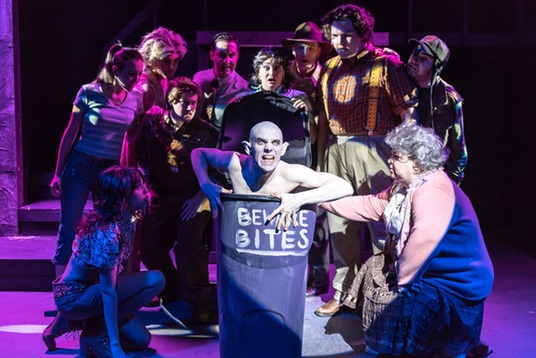Through Sat 10/31
In June 23, 1992, if you believed the supermarket tabloid Weekly World News, you’d have accepted that a “large-eyed, fanged human child” was found in a southern West Virginia cave.
According to the now-defunct tabloid, their story was factual. The “half human, half bat” was examined and confirmed by scientists and U.S. government officials. It was reported that the original scientist who found him was “Dr. Ronald Diller.” The existence of the bat boy was “confirmed by Matthew Daemon, S.O.S. (Seeker of Subcultural Supernaturals.)” Several times the creature was captured but managed to escape so he couldn’t be viewed by the general public.
“The original front-page photo of the bat boy, showing his grotesque screaming face, was the second-best selling issue in the tabloid’s history” and has since evolved into a pop-culture icon.
As it turns out, the story was concocted by the tabloid’s editor, but the urban legend does not cease. According to various sources, “Bat Boy,” as he is now officially known, has evolved from a two-foot, nineteen pound boy to a five-foot tall “animal person.” He ran for California governor in 2003. In October, 2008, he endorsed John McCain for president, but in the course of the election cycle, he switched to Barack Obama. In November, 2008, Bat Boy allegedly was seen protesting the passage of California’s Proposition 8.
In 1997, the Bat Boy became observable when he emerged as the leading character in Bat Boy the Musical. The music and lyrics are by Laurence O’Keefe, with book by Brian Flemming and Keythe Farley. An off-Broadway production ran from mid-March until early December of 2001 and won the Lucile Lortel Award for best Off-Broadway musical.
The musical has the Bat Boy learning to speak, thanks to his adoptive family. He yearns to be like other humans, suffers hatred and violence from the local town folk, is the victim of jealous rage, and comes to a tragic end. The story begins when three teenage spelunkers discover Bat Boy in a cave. One of the teens, Ruth, is bitten by the “thing.” Eventually, Bat Boy is captured, and taken to the home of Dr. Parker, the local veterinarian, while Ruthie is admitted into the hospital.
The doctor’s wife, Meredith, takes a liking to the creature and is determined to transfer Edgar, the name given him by Meredith and her daughter Shelley into a well-mannered human. Aided by British English audio tapes, Edgar not only learns to speak with a British accent, but to control his bat urges.
Meredith and Shelley are unaware that Dr. Parker has been feeding Edgar blood, the only food source Bat Boy can absorb, thus keeping him in a bat-like state. The townspeople are concerned because their cows keep dying off. When Ruthie dies after being given poison by Dr. Parker, who is jealous of the attention Edgar is getting from Meredith and Shelley, the town turns on Edgar as the cause of their problems.
Shelley, in the meantime, has fallen in love with Edgar, and the duo, with the guidance of Pan, the Greek god of the wild, have a sexual liaison. When Meredith finds out about the relationship, she reveals a closely guarded secret about Edgar’s identity. Chaos results and, much like any tragedy, even farcical ones, the play ends with the stage littered with dead bodies.
The musical, which is a fantasy-farce, does contain some serious themes, including prejudice being shown toward those who are different, the effects of rumor-mongering, the consequence of seeking revenge and the power of scapegoating.
Director Patrick Ciamacco has a way with staging the bizarre. Bat Boy the Musical is his cup of tea. Okay, cup of blood. The goings-on are a “hoot.” The cast plays for reality, a requirement for making farce work. They allow the audience to laugh at the outlandishness of the material. The cross-dressing, a highlight device of some of Ciamacco’s shows, works to add to the ridiculousness.
Slight, compact Pat Miller is outstanding as the Bat Boy Edgar. Complete with fanged teeth and eerie contact lenses, he prowls, hangs from the rafters, attacks and sucks blood with compelling ease. He has an excellent singing voice and creates a completely believable character.

Amiee Collier uses her fine acting to develop Meridith as a compassionate but frustrated woman. She displays a well-trained singing voice. Brian Altman sings admirably and makes playing evil look easy as the despicable Dr. Parker. Stephanie Harden has a nice singing voice and does a fine transition, taking Shelley from a hater to a lover of Edgar. The rest of the cast are quite convincing in their portrayals.
Highlight musical numbers include “A Home for You,” “Show You a Thing or Two,” “Let Me Walk Among You” and “Inside Your Heart.” The explosive choreography for “A Joyful Noise” made it a showstopper. Katie Zarecki’s choreography was generally creative. Jenniver Sporano’s costumes, Cory Molner’s lighting, Noah Hrbek’s animations and PJ Toomey’s special effects all added considerably to the production.
Lawrence Wallace and his band (Rachel Woods, Ernie Molner, Zach Davis and Jason Stebelton) played well and generally do a nice job of underscoring, rather than overpowering the performers.
CAPSULE JUDGMENT: Bat Boy the Musical is a farcical show, which gets an entertaining production at Blank Canvas under the creative direction of Pat Ciamacco. To truly appreciate the show you have to go with the attitude that you are going to put aside reality and have a fun-filled time. It’s worth seeing the show, if for no other reason, to observe the wonderful character development by Pat Miller as the Bat Boy.
Bat Boy the Musical runs through Sat 10/31. For tickets go to blankcanvasthetre.com.
Blank Canvas’s next show is Reefer Madness (12/4-19), a raucous musical comedy based on the 1936 cult film of the same name. As the production’s advertisement says, “It will go straight to your head!”
[Written by Roy Berko, member, American Theatre Critics Association, Cleveland Critics Circle]